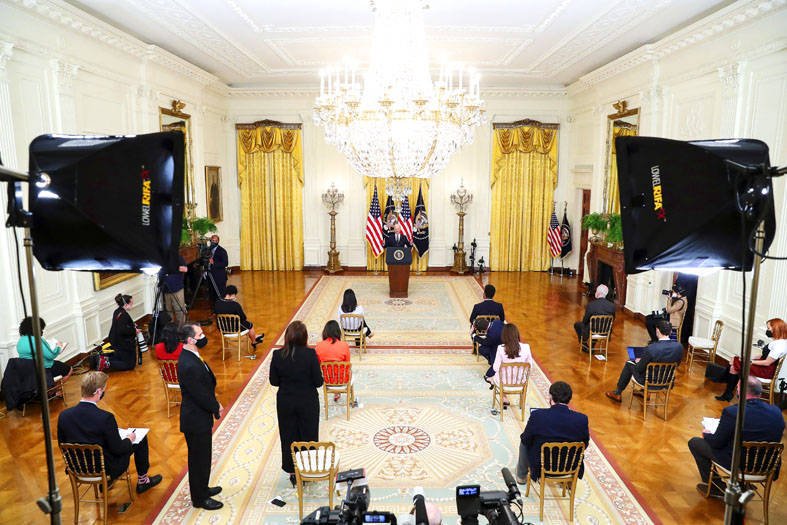《TAIPEI TIMES》 US to outspend China to curb its rise: Biden

Reporters on Thursday sit socially distanced during US President Joe Biden’s first formal news conference in the White House in Washington since taking office. Photo: EPA-EFE
‘DEMOCRATIC ALLIANCE’: Emphasizing that the US would work with allies instead of acting alone, Biden said that he seeks to coordinate with like-minded nations on China
/ Bloomberg
US President Joe Biden on Thursday promised to outspend China on innovation and infrastructure to prevent it from overtaking the US to become the world’s most powerful country.
However, at his first news conference since taking office, Biden declined to say whether he would keep tariffs in place on the majority of Chinese imports or ban products made from forced labor.
“I see stiff competition with China,” Biden said at the White House. “They have an overall goal to become the leading country in the world, the wealthiest country in the world and the most powerful country in the world. That’s not going to happen on my watch, because United States is going to continue to grow and expand.”
Biden is just beginning to establish his relationship with China, the world’s second-largest economy, after former US president Donald Trump imposed tariffs and sanctions, and blamed Beijing for the spread of COVID-19.
Biden’s comments came days after US Secretary of State Antony Blinken, US National Security Adviser Jake Sullivan and their Chinese counterparts traded criticism on human rights and national security issues during a two-day face-to-face meeting in Alaska.
Blinken said that the US raised concerns over issues including Taiwan, Hong Kong, China’s crackdowns in the Xinjiang region and cyberattacks.
Chinese Central Foreign Affairs Commission Director Yang Jiechi (楊潔篪) blasted what he described as US hypocrisy and called the US the “champion” of cyberattacks.
On Thursday, Biden refused to answer a question about whether he is more likely now than before entering office to keep in place tariffs on Chinese imports, or whether he is considering banning products that are produced with forced labor in Xinjiang.
“Look, they’re each specifically legitimate questions, but they only touch a smidgen of what the relationship with China really is about,” he said.
Biden said that the US values human rights, and he would continue to work with allies to call out China’s treatment of Uighurs and its actions in Hong Kong.
“The moment a president walks away from that, as the last one did, is the moment we begin to lose our legitimacy around the world,” he added.
Biden said that he intends to invite “an alliance of democracies” to the White House “to discuss the future” and make sure that everyone is on the same page with respect to China and other issues.
The Biden administration is still developing its overall China strategy, including how it will treat Chinese technology firms and a trade deal negotiated by the Trump administration.
Biden has said that Washington would compartmentalize its engagement with China — approaching the relationship from a competitive standpoint when necessary, and working with Beijing on matters like climate change and North Korea.
The US is also emphasizing working with allies instead of acting alone.
So far, the Biden team is maintaining the same tough line that Trump took on Beijing’s economic and human rights practices.
The US Department of Commerce earlier this month issued subpoenas for several Chinese communications firms, and is adopting a Trump administration rule to block transactions involving Chinese goods and services in the information and communications technology supply chain.
The Biden administration in concert with European partners this week announced sanctions on Chinese officials for alleged human rights violations against Uighurs. Beijing has denied allegations of such abuses and continues to lash out at the international community for spreading what it considers lies.
Biden has also signed executive orders aimed at boosting US manufacturing and bolstering critical US supply chains, including for semiconductors and rare earths — for which the US is heavily dependent on other countries, including adversaries like China.
新聞來源:TAIPEI TIMES














